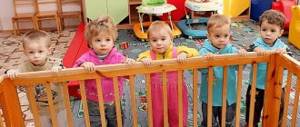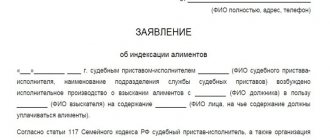Home / Family law / Parental rights
Back
Published: 03/04/2018
Reading time: 7 min
0
523
The fate of minor children left without parental care can be arranged in various ways - transfer to an orphanage, adoption or upbringing in a foster family.
- Concept of foster family
- Rights and responsibilities of adoptive parents
- The difference between the rights of adoptive parents and the rights of relatives
Foster parenting has a number of significant differences, both from adoption and from placement in a child care institution, and is under the control of social services.
Requirements for guardians
There are a number of requirements that determine the possibility of becoming a foster parent:
- no serious health problems. There is a certain list of diseases. The main ones are: cancer, mental problems, alcohol or drug addiction;
- living conditions and stable work;
- the psychological portrait of the candidate is based on his characteristics at his place of residence and work;
- no criminal record. The candidate must not have any problems with the law.
Recently, a very good practice has emerged to train candidates for adoptive parents or guardian parents. After completing the training, it is much easier for parents to adopt a child. Therefore, before deciding to create a foster family, you should carefully study all the conditions necessary for this.
Responsibilities of foster parents
Child education
Placing a child in a foster family is a legal process; the rights and responsibilities of foster parents are spelled out and regulated by the norms of the RF IC, the Regulations on Foster Family, the Civil Code of the Russian Federation, etc.
The responsibilities of foster parents are:
- in caring for the physical health of the child;
- in organizing the education and leisure of a minor;
- in protecting all the rights and interests of the child;
- timely notification of guardianship authorities about troubles in the family;
- The responsibilities of adoptive parents include providing a timely report to the guardianship authorities on the process of upbringing and the expenditure of funds for the maintenance of children.
In addition to everyday issues, raising a foster child should be based on mutual respect and trust between parents and children.
Caring for the child’s physical health and treatment
Let's take a closer look at the rights and responsibilities of a foster family.
Based on regulations, legal regulation requires foster families to take care of the child’s health.
The health of the child, his comprehensive development, child care, treatment of the child, systematic examination by doctors, following their recommendations and monitoring the child’s condition is the responsibility of the adoptive parent.
Organization of education and leisure
A foster family is the same form of upbringing as raising a child in his own family.
Therefore, the parental and professional functions of a foster family are the same as in a regular one.
One of the important functions is organizing the education of children and getting them educated.
According to paragraph 6 of Article 148.1 of the RF IC, adoptive parents not only have the right to choose a school or kindergarten, but are also obliged to place their child in an educational institution to receive an education.
The foster parent is obliged to monitor the child’s behavior, attendance, studies, attend the educational institution, and have constant contact with the curator, educators, and teachers.
Protection of legal rights and interests
Once in a foster family, a child receives rights and protection.
The responsibility of adoptive parents lies in the fact that they are obliged not only to create the necessary conditions at home, but also to guard the interests of the minor and his legal rights.
From the moment of placement in a foster family until the end of the period of stay in it, the child is completely under the protection of the adoptive parents. Until the age of 10, the interests of the child are taken into account by the guardianship authorities; after 10 years, the child himself can make a decision and give consent to live in a foster family. But it is the adoptive parents who take on the functions of legal representatives of minors.
This applies to all areas of life, including in matters of safety of children’s property. The procedure for disposing of the property of a minor is prescribed in Article 37 of the Civil Code of the Russian Federation. Adoptive parents have the right to make transactions on behalf of minors and can give permission to carry out transactions that the child does not have the right to make.
If it is in the interests of the child to communicate with biological relatives, then the adoptive parents are obliged to allow him to do this. The same applies to communication with potential adoptive parents.
Elimination of unfavorable living and upbringing conditions
The responsibilities of the guardianship authorities include monitoring the living conditions and upbringing of children living in foster families.
During the first three months, home visits are carried out at least once a week. Over the next year - once a month, then - once a quarter.
In this way, the responsibility of the adoptive parent to create favorable conditions is controlled.
According to paragraph 3 of Article 153 of the RF IC, adoptive parents must promptly report to the authorities about all changes occurring in the family, in particular, if unfavorable conditions arise, especially when there is a threat to the life and health of the child. Failure to comply with this requirement will result in administrative or criminal penalties.
Adoptive parents are responsible for harm caused by a child under 18 years of age
Foster parents are responsible for the behavior of children during extracurricular and free time, during summer and seasonal holidays. From the moment they reach adulthood, responsibility falls on the children themselves.
As for administrative and criminal actions, the law sets the age from which the child himself will be punished for committing illegal actions.
In some cases, the child may be placed in specialized institutions, colonies for children. However, due to his age, he cannot pay a fine or incur other types of punishment. In this case, the legal representatives will be punished.
Article 153 of the RF IC. Adoptive parents (current version)
1. In cases where spouses act as adoptive parents, each of them simultaneously acts as a guardian (trustee). Accordingly, their liability under the foster family agreement will be joint and several. However, it should be taken into account that according to Art. 10 clause 9 of the Law on Guardianship and Trusteeship, when several guardians or trustees are appointed, the responsibilities for providing the ward with care and assistance in the timely receipt of medical care, and in relation to a minor ward, also the responsibilities for his education and upbringing are distributed between the guardians or trustees in accordance with the act guardianship and trusteeship authority on their appointment or an agreement on the implementation of guardianship or trusteeship.
Individual unmarried citizens can also act as adoptive parents. However, unmarried persons cannot be adoptive parents of the same child.
The basis for concluding an agreement on a foster family is an application by the person(s) to transfer a specific child to them for upbringing, which is submitted to the guardianship and trusteeship authority at the place of residence (location) of the child, and an act of the guardianship and trusteeship authority on the appointment of the specified person(s) as guardians or trustees.
In accordance with the Rules for creating a foster family, an agreement can be concluded both in relation to one minor ward and in relation to several wards. The number of children in a foster family, including natural and adopted children, should, as a rule, not exceed 8 people (clause 3 of the Rules). It is not allowed to conclude an agreement through a representative of the guardian.
The agreement is concluded at the place of residence of the ward and the guardian within 10 days from the date the guardianship and trusteeship authority at the place of residence of the minor citizen makes a decision to appoint a guardian. If the place of residence of the ward changes, the contract is terminated, and a new contract is concluded by the guardianship and trusteeship authority at his new place of residence.
If disagreements arise between the parties when concluding an agreement, the guardianship and trusteeship body, which has received from the guardian a written proposal to agree on the disputed terms, within 6 days from the date of receipt of the proposal, takes measures to agree on the terms of the agreement or notifies the guardian in writing about the refusal of its conclusion.
According to clause 4 of the Rules for the selection, registration and training of citizens who have expressed a desire to become guardians or trustees of minor citizens or to accept children left without parental care into a family for upbringing in other forms established by the family legislation of the Russian Federation, a citizen who has expressed a desire to become a guardian represents the following documents to the guardianship and trusteeship authority at the place of residence (a similar set of documents must be submitted by citizens who have expressed a desire to become adoptive parents):
a) an application requesting to be appointed as his guardian;
b) a certificate from the place of work indicating the position and the average salary for the last 12 months, and for citizens who are not in an employment relationship - another document confirming income (for pensioners - copies of a pension certificate, a certificate from the territorial body of the Pension Fund of the Russian Federation) Federation or other body providing pensions);
c) an extract from the house (apartment) register from the place of residence or another document confirming the right to use the residential premises or the right of ownership of the residential premises, and a copy of the financial personal account from the place of residence;
d) a certificate from the internal affairs bodies confirming that the citizen who has expressed a desire to become a guardian has no criminal record for a deliberate crime against the life and health of citizens;
e) a medical report on the state of health based on the results of an examination of a citizen who has expressed a desire to become a guardian, issued in the manner established by the Ministry of Health and Social Development of the Russian Federation;
f) a copy of the marriage certificate (if the citizen who has expressed a desire to become a guardian is married);
g) written consent of adult family members, taking into account the opinion of children over 10 years of age living together with a citizen who has expressed a desire to become a guardian, to accept a child (children) into the family;
h) certificates of compliance of residential premises with sanitary and technical rules and regulations, issued by the relevant authorized bodies (issued at the request of the guardianship and trusteeship authority free of charge);
i) a document confirming the completion of training of a citizen who has expressed a desire to become a guardian, in the manner established by these Rules (if any);
j) autobiography.
As follows from Art. 153.1 of the RF IC (see commentary), the amount of remuneration due to adoptive parents, the amount of money for the maintenance of each child, as well as measures of social support provided to the adoptive family depending on the number of children accepted for upbringing, are determined by the agreement on the adoptive family in accordance with with the laws of the constituent entities of the Russian Federation.
The commented article contains references to the Civil Code of the Russian Federation, the Law on Guardianship and Trusteeship and Art. 146 RF IC. The latter contains requirements for the personality of the guardian and trustee regarding his legal capacity, moral and personal qualities, state of health, etc. All these requirements apply to adoptive parents. So, according to this article:
1. Only adults with legal capacity can be appointed as guardians (trustees) of children. Persons deprived of parental rights cannot be appointed as guardians (trustees).
2. When assigning a guardian (trustee) to a child, the moral and other personal qualities of the guardian (trustee), his ability to perform the duties of a guardian (trustee), the relationship between the guardian (trustee) and the child, the attitude of the guardian (trustee’s) family members towards the child are taken into account, and also, if possible, the desire of the child himself.
3. Persons with chronic alcoholism or drug addiction, persons suspended from performing the duties of guardians (trustees), persons limited in parental rights, former adoptive parents, if the adoption was canceled due to their fault, as well as persons who state of health (clause 1 of Article 127 of the RF IC) cannot fulfill the responsibilities of raising a child.
The list of diseases in the presence of which a person cannot take a child into a foster family is established by Decree of the Government of the Russian Federation of February 14, 2013 N 117.
This list includes:
1. Tuberculosis of the respiratory system in persons belonging to groups I and II of dispensary observation.
2. Infectious diseases until dispensary observation is terminated due to stable remission.
3. Malignant neoplasms of any localization of stages III and IV, as well as malignant neoplasms of any localization of stages I and II before radical treatment.
4. Mental disorders and behavioral disorders until dispensary observation is terminated.
5. Drug addiction, substance abuse, alcoholism.
6. Diseases and injuries leading to group I disability.
2. Due to the fact that an agreement on a foster family is a type of agreement on guardianship and trusteeship, both rights and obligations, and liability for failure to fulfill or improper performance of the duties assigned to adoptive parents can be administrative, criminal or civil.
So, according to Art. 5.37 of the Code of the Russian Federation on Administrative Offenses, illegal actions to transfer a child to a foster family entail the imposition of an administrative fine on citizens in the amount of one thousand to two thousand five hundred rubles; for officials - from four thousand to five thousand rubles; for legal entities - from two hundred thousand to five hundred thousand rubles.
In addition, according to Art. 156 of the Criminal Code of the Russian Federation, failure to fulfill or improper fulfillment of duties for the upbringing of a minor by a parent or other person entrusted with these duties, as well as by a teacher or other employee of an educational organization, medical organization, organization providing social services, or other organization obliged to exercise supervision for a minor, if this act is associated with cruel treatment of a minor, is punishable by a fine in the amount of up to one hundred thousand rubles or in the amount of the wages or other income of the convicted person for a period of up to one year, or by compulsory labor for a term of up to four hundred forty hours, or by corrective labor for a term of up to two years, or forced labor for a term of up to three years with deprivation of the right to hold certain positions or engage in certain activities for a term of up to five years or without it, or imprisonment for a term of up to three years with deprivation of the right to hold certain positions or engage in certain activities for a period of up to five years or without it.
The law on guardianship and trusteeship (which also applies to adoptive parents) in Art. 26 clause 1 established that guardians are liable for transactions made on behalf of the wards in the manner established by civil law.
As already noted, an agreement on a foster family should be considered as a type of agreement on the provision of paid services. Accordingly, this agreement may provide for such a form of liability as a penalty for various types of violations of the terms of the agreement. In addition, regardless of the presence of conditions in the contract, the parties are obliged to compensate for losses arising due to their fault.
Comment source:
“ARTICLE-BY-ARTICLE COMMENTARY TO THE FAMILY CODE OF THE RUSSIAN FEDERATION” UPDATED
S.P. Grishaev, 2017
Guardians' rights
Clause 3 of Article 153 of the RF IC defines the rights of adoptive parents to raise children:
- carry out the educational process;
- choose the methods of upbringing yourself and in accordance with the laws and interests of children;
- foster family status allows you to choose any educational institution;
- return the child from people who are illegally detaining him;
- make transactions with property, but only with the permission of the guardianship authorities and in the interests of the child.
The right to demand the return of the child from the person illegally detaining him (usually relatives deprived of parental rights)
As was said earlier, adoptive parents should not interfere with communication with relatives, his parents.
An exception is if such communication violates the rights of the child and does not correspond to his interests.
At the same time, there are cases when, after such communication, relatives do not allow children to return to foster families. Therefore, the adoptive family has the right to file a lawsuit to resolve the issue of returning the child to the foster family.
The right to independently choose forms of education for the child (taking into account the opinion of the guardianship authorities and the child)
Clause 6 of Article 148.1 of the RF IC gives adoptive parents the opportunity to choose an educational institution and place the child in a preschool institution on a general basis. The form of education is chosen at the discretion of the parents, but taking into account the interests of the child and the opinion of the guardianship authorities.
How to be a working foster mother: parents' experience and advice from a psychologist
How to be a working foster mom? Foster families shared their personal experiences with the “Change One Life” foundation, and professional psychologist and adoptive mother Daria Dmitrieva said that in the first year, parents are unlikely to be able to combine professional activities and caring for adopted children, without reducing the quality of work and relationships in the family .
Combining the responsibilities of a foster mother and working - is it possible to do it all? Photo - pointwords.pw
Recently, a future adoptive dad asked for advice from experienced parents. He said that he and his wife are planning to take a child aged three years or older. “Should my wife, other things being equal, leave work in order to be with him constantly, to pick him up early from kindergarten? – asked the future father. – Or if it’s a teenager, then you need to help him with his homework, just be near him. I understand that everything is individual, what needs to be looked at, what kind of child it is, but still, how is this issue resolved? What do psychologists say?
Many adoptive mothers responded to the question on social networks. Opinions were divided. “The child will be tested for strength and brought to the most difficult emotions,” Olgusshka warns. — If you are ready to let your wife go to a beauty salon or visit her friends once a week, just sleep alone, without a child by her side, then she has a chance to pull out both the child and the job... If she has a burden of responsibility on her, then it will be both the baby and the work suffer.” An experienced foster mother also advised spending at least the first week with the child and only then going to work.
“But when the honeymoon ends and the child starts crying out in pain, you need to be able to take vacation or sick leave from work. And stay at home with the child.”
Working foster mothers admit that combining work and raising foster children is quite difficult. “They took a 2.8-year-old girl,” writes Svetlana. — At work, when I brought my daughter home, I took a vacation of 28 days + 14 days at my own expense (July-August). The management made concessions to me, and I left work at 16.30 (I had to drive more than an hour and a half to get home). I solved all the “defects” at work either late in the evening or on Saturday. The husband was working with the child. On August 25, my daughter went to kindergarten. It was very, very difficult. Even though the girl is healthy, we don’t need to run around to hospitals with her.”
Some mothers manage to find part-time work. “My child requires so much attention that I can’t imagine how I can be busy full time,” writes Maria. — Adaptation, that’s all. The child is nearby all the time, asking to evaluate, watch, sit with him. I have to catch up with my studies. It is necessary for the child to get used to it so that the connection can be established as much as possible. In our case, there is a strong need to get attention that has not been received. So, for example, I’m still very part-time.”
Elena Letyagina also believes that a part-time mother is an ideal option. “While the child is in kindergarten or school, you can work. And there are issues with various structures and bodies, and when to solve them,” writes Elena. “And then every time you ask for time off from work: either you need to go to a guardianship, or to school, or to see correction specialists, or for a medical examination.” And then there’s the battle for summer vacation at work... But, you have to work like “Papa Carlo,” returning at nine in the evening, and immediately start doing homework (when children are supposed to be asleep at nine). But it’s also impossible to sit at home with your children all the time - you become dumb and go wild! Where can we find the golden mean?
Rimma was convinced from her own experience that it would be better if “the adoptive mother spends 24/7 with the adopted child. Depending on the degree of attachment disorder in the adopted child, from one to three years. With reactive attachment disorder, this period can be even longer.” And Galina notes that if possible, it is better to leave work for at least three to six months.
“You need to return to work gradually, if you want, building work into a new regime and way of life,” writes Galina.
Lada Yarkova took a vacation for the first 2 weeks, then enrolled her child in a private kindergarten. “In two months - another 2 weeks + 2 weeks for my husband. And again kindergarten. We combine work and daughter perfectly,” says Lada. But not everyone is ready to cite such schemes as an example. For example, Anna is sure that “it is impossible to give unambiguous recommendations, because everything depends on the child, his state of health, attachment and previous experience.”
“I continue to work,” says Natalya Suvorinova. “Moreover, at work they still don’t know about the changes in my life. But I have a part-time work week and a relatively flexible schedule. There are some peculiarities: when you have to go to work, you have to go without any options or excuses. We also have a grandmother. Everything would have been fine, but almost simultaneously with the birth of a child in the family, the eldest daughter’s disease, which had already been cured, relapsed.
This turned out to be a heavy blow, I am literally torn between all these problems. Very hard! Sometimes I had to simultaneously plan the examination of the older one, the preparation of some regular documents for the younger one and the work day. It's horrible! I was literally on the edge! Oh, it would be better not to work!”
Expert commentary
Daria Dmitrieva, child and family psychologist, adoptive mother:
Unfortunately, often the question of whether or not a foster mother should go to work soon after accepting a child into the family depends not on the desire of the foster mother, what is best for the child and the family, but on the family’s inability to live without the mother’s financial support. I dream that one day maternity leave will be legislated for a period of one year for all adoptive mothers, regardless of the age of the adopted child.
It just seems like why sit on maternity leave after three years, well, I took a month off, went through all the authorities, filled out the papers and went to kindergarten, and there’s nothing to say about the schoolchildren - they spend half the day at school.
Firstly, the first year in a family is a golden time for the formation of attachment, and it is great if there is an opportunity to make the most of it.
Secondly, when joining a family, the child’s psychological age, which may not correspond to the passport age anyway, seems to be reset to zero. Gradually, some more slowly, children regress, returning to that age where they did not get something vital for themselves.
This does not mean that, for example, a teenager will suddenly lose his speech and start cooing sweetly, but he can easily demonstrate the features of emotional self-regulation at the level of a three-year-old. A preschooler who was excellent at dressing and undressing himself, brushing his teeth and making his bed may suddenly forget how to do all this. Babies can literally not let their mother go one step at a time, choking on bitter crying until they turn blue in the face.
The more time adults can spend with a child, the more opportunity they have to give the child what is so important to him without unnecessary hassle.
And finally, going to kindergarten or school itself is a serious stress for most children (perhaps the only exception is those children whose ability to establish attachment relationships with peers is significantly higher than their ability to establish attachment relationships with adults). The baby may cry and they will call you from the kindergarten, asking you to come and take him home. A schoolchild can write you endless messages, forget everything possible, get into various stupid stories, getting out of which will be a separate quest for mom. And although this is very troublesome and, at times, downright unpleasant, the fact that the child is testing the strength of your connection - “I called/got into trouble - mom came and helped” is a very good signal.
Children require attention and love; it is not easy for them to let their mother go to work. Photo — mama-snob.ru
The last thing I want to say, but by no means the least important, adaptation is not only the adaptation of the adopted child to the family, but also the adaptation of the entire family to its new member. The appearance of even a very desired and long-awaited child in a family is always stressful, simply because all family routines and relationships begin to change and rebuild in order to accept a new person.
For mothers, who, as a rule, spend the most time with their children, in addition to taking care of the child and household chores, it is simply vital to have time to relax and the opportunity to take care of themselves. The more resourceful a mother is, the more stable, flexible and sensitive she can be in relation to the different manifestations of children. It happens that a woman is so tired that, even when someone at home offers to replace her for a few hours, she simply no longer has the strength to go somewhere and unwind.
SUPPORT ADOPTION PARENTS
Perhaps the only situation when a mother, if she does not have the opportunity to regularly leave her child for several hours with one of the family members, is better off going to work (we are talking about a situation where there is a financial opportunity not to work), this is a very difficult adaptation.
It happens that the child’s behavior or the mother’s feelings that flare up in response to the child’s traumas are so on the verge of unbearability that going to work is the only way for the mother to be distracted, not to reach a state of emotional burnout and not constantly lash out at the child.
There is another not so common situation when a child has some very traumatic experience in relationships with women, quickly forms an attachment to the father, but does not accept the mother or is even afraid (despite the fact that the mother does not do anything dangerous and treats the child well ), then a woman going to work can allow the father to spend more time with the child (men also have less than full-time jobs).
In all other cases, the opportunity to be at home (provided that periodically there is an opportunity to go somewhere to relax without the child) or to work part-time is much more beneficial for mother and child. This does not mean that working mothers are definitely doomed to a more difficult and lengthy adaptation and are wrong for deciding to keep their jobs.
All situations are very individual, and in any case, for a child to be in a family, even if his mother cannot be with him always when he needs it, is much better than life in an orphanage.
Child's rights
Chapter 11 of the RF IC defines the rights of a child in a foster family:
- a child's right to know everything about his parents. The exception is cases when it is not possible to provide all the information or the information will harm the child;
- the child has the right to live and be raised in a family. Therefore, placement in family forms of education is a priority;
- the right to receive alimony, survivor benefits, any social benefits;
- The legal status of a foster family gives the child protection of his rights and legitimate interests. This means that the child can appeal to the guardianship authorities with a complaint that there is a violation of his rights, abuse of parental responsibilities. From the age of 14 he can take these issues to court;
- ownership of housing, property and use of it;
- the right to income received from one's own property. At the age of 6 to 14 years, a child can make small transactions himself. From 14 to 18 years old - at your discretion, dispose of your earnings, any of your income.
The rule of taking into account the child’s opinion (in any issue, at any age, when he is able to express it, taking into account the pedagogical and educational goals and opinion of the guardian)
Article 57 of the RF IC gives the child the right to freely express his opinion.
Until the age of 10, his interests are represented by guardianship authorities. From the age of 10, a child has the right to decide some issues himself.
For example, placing him in a foster family. In addition, a teenager can influence the choice of a parent. If the child's attitude is negative, placement in a family is impossible.
When choosing an educational institution, the child’s opinion is also taken into account, as is the case when resolving issues that at least slightly concern the minor. As for relationships in the family, this lies in the area of morality and ethics.
On the progress of implementation of the President’s instructions to the Government
The number of families in which the duties of guardianship and trusteeship are performed for a fee in 2012 amounted to 74,644 (17.8% of the total number of foster families). The number of children being raised in such families in 2012 was 116,945 (22.8% of the total number of children being raised in foster families).
The government reported on the work to implement Presidential Order No. Pr-877 dated April 18, 2013 (subparagraph “e” of paragraph 1) on establishing at the federal level requirements for the activities of “professional” foster families, as well as on supporting foster families.
General requirements for persons wishing to accept a child left without parental care into a family, their rights and obligations are established by the Civil Code, the Family Code and the Federal Law “On Guardianship and Trusteeship”.
Requirements for the activities of foster families are also established by the Rules for organizing a family-type orphanage.
Currently, the legislation provides for the fulfillment of the duties of foster parents on a reimbursable basis.
The number of families in which the duties of guardianship and trusteeship are performed for a fee in 2012 amounted to 74,644 (17.8% of the total number of foster families). The number of children being raised in such families in 2012 was 116,945 (22.8% of the total number of children being raised in foster families).
However, the legislation does not establish separate requirements for such categories of foster families. Citizens who accept orphans into their families, as a rule, are not professional teachers and educators, and therefore the issue of establishing requirements for “professional” foster families at the federal level requires additional study, including regarding the need to develop professional standards for such categories of families.
The Federal Law “On Amendments to Articles 127 and 146 of the Family Code of the Russian Federation and Article 271 of the Civil Procedure Code of the Russian Federation,” which came into force on September 1, 2012, introduced mandatory training for citizens wishing to adopt a child into their family.
The order of the Ministry of Education and Science approved the requirements for the content of the training program for persons wishing to adopt into their family a child left without parental care, and the form of the certificate of completion of such training on the territory of the Russian Federation.
Recommendations on the organization and implementation of activities to prepare persons wishing to accept into their family a child left without parental care have been sent to the executive authorities of the constituent entities of the Russian Federation, performing the functions of guardianship and trusteeship authorities in relation to minor citizens.
In the regions, work is underway to create a system of services to assist in the family placement of children left without parental care, preparation and support of foster families. Currently, in the constituent entities of the Russian Federation there are more than 1,200 organizations operating in the preparation and support of foster families. By 2015, it is planned to ensure the creation of a system of such services in every subject of the Russian Federation.
In order to ensure the development of a system of support for foster families, providing them with medical, psychological, pedagogical, legal, and social assistance, Federal Law No. 167-FZ of July 2, 2013 amended a number of legislative acts, providing for:
— empowering guardianship and trusteeship authorities to assist guardians and trustees of minor citizens in the implementation and protection of the rights of their wards;
— legislative definition of the right of guardians and trustees, adoptive parents, when exercising their rights and obligations, to assist them in providing medical, psychological, pedagogical, legal, and social assistance. At the same time, it is established that the conditions and procedure for providing assistance in the provision of this assistance are determined by the legislation on social services;
- addition of categories of citizens entitled to receive free legal assistance within the state system of free legal assistance, persons from among orphans and children left without parental care, persons wishing to adopt a child left without parental care into their family, if they apply for free legal assistance on issues related to placing a child in foster care, adoptive parents, if they apply for free legal assistance on issues related to ensuring and protecting the rights and legitimate interests of adopted children.
The State Duma adopted in the first reading the draft federal law “On the fundamentals of social services for the population in the Russian Federation.”
Currently, the Ministry of Labor, the Ministry of Health, and the Ministry of Education and Science are working to prepare amendments to this draft federal law, within the framework of which it is proposed to include disabled children, orphans and children without parental care, as well as “professional” substitutes, among the recipients of social services. families who took in orphans and children left without parental care.
Legal consequences of foster care and liability
The legal consequences of foster care are strictly regulated by law.
When sending a child to a foster family, a cooperation agreement is concluded between the guardianship authorities and the foster parents. The adoptive family uses its family law in strict accordance with the law.
According to the agreement, adoptive parents not only receive rights and responsibilities; the law also regulates the procedure for payments for performing the functions of adoptive parents.
Violation of rights and obligations entails legal, administrative and criminal penalties.










